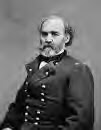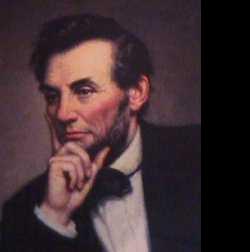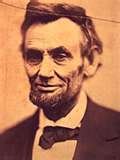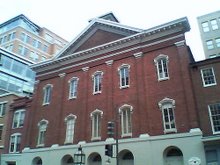
Eloquence is made perfect by time, but so is folly. Take a look at the following quotes and see if time hasn’t added a certain irony to all of them:
"They couldn't hit an elephant at this distance"- Union General John Sedgwick spoke these words just moments before being shot dead by a confederate sniper at Spotsylvania.
Uh-oh. Just when you think it’s safe to brag. Now Lincoln would never have made a statement like this. Though he took risks, coming under sniper fire at least once at a fort in Washington, he knew his tall frame was an easy target and usually kept silent about the abilities of the enemy to shoot straight.

"Why not bury the dead in Lee’s backyard?" - Gen. Montgomery Meigs made this statement in a last spiteful effort to keep the Lees from returning to Arlington. His goal was to populate Mrs. Lee’s rose garden with the bodies of Union soldiers, making the grounds unlivable. What made him think that by burying corpses, he wasn’t helping out with the rose garden?
Lincoln would never have made this statement because he understood the ways of botany. Meigs himself supervised the burial of 26 Union soldiers in Mrs. Lee's rose garden. In October of 1864, Meigs' own son was killed in the war, and he too was buried at Arlington.

"That old man had my division massacred at Gettysburg." -George Pickett said these words about Robert E. Lee to John S. Mosby shortly after paying Lee a visit in Richmond. Perhaps the best answer to this was Mosby’s – "Well, it made you famous."
Lee was distraught over the failure of Pickett’s charge and blamed himself. Pickett’s effort to pass along more blame somehow doesn’t sit well. Lincoln would never have said this quote about his top general, because for a great part of the time his top general was George McClellan, who never had anybody massacred. In fact, when McClellan excused his lack of action in the fall of 1862 due to tired horses, Lincoln contributed his own infamous quote:
"Will you pardon me for asking what the horses of your army have done since the battle of Antietam that fatigues anything?"
McClellan was removed from command shortly thereafter.









4 comments:
Hot damn, another great post.
Are you psyched for Guy Richie's vision of Holmes with Downie??? I think it's gonna rock.
On behalf of the Abraham Lincoln Bicentennial Commission, we wanted to let you and your blog readers know about an upcoming event that may be of interest to you.
As Miami joins in the celebration of Abraham Lincoln’s 200th birthday, the Abraham Lincoln Bicentennial Commission is proud to host a Lincoln Town Hall exploring the theme of “Lincoln, Miami and the American Dream.” The Town Hall, taking place November 1, will be led by Channel 4 anchorman Antonio Mora. Respected panelists, including Miami-Dade Mayor Carlos Alvarez, Schools Superintendent Alberto Carvalho and the Knight Foundation’s Alberto Ibarguen, among others, will weigh in on the impact that Lincoln’s life and words have on the Miami of today.
Dr. Henry Louis Gates Jr., Director of the W.E.B. Dubois Institute for African and African American Research at Harvard University, will also join the dialogue and discuss his new book, Lincoln on Race & Slavery. In addition, attendees will be treated to the musical works of the Ambassador Chorale of Florida Memorial University and the orchestra of the New World School of Arts, as well as an excerpt from the work “Lincoln’s Portrait”, narrated by former Miami Heat player Alonzo Mourning.
All events are free and open to the public, but an RSVP is required for the Town Hall. Please visit http://www.hmsf.org/lincoln/events.html for more information on event times and locations, and to find out how to RSVP.
You can also connect with us and join the discussion today through Facebook http://facebook.com/Abraham.Lincoln.Bicentennial.Commission and Twitter http://twitter.com/lincoln200yrs.
Please feel free to share this information with your followers, and anyone else that you believe may enjoy this opportunity. We hope that you will join us for this exciting event.
Warm regards,
Malorie
malorie_janasek@jtpr.com
Interesting post. Thanks for making me chuckle.
Post a Comment